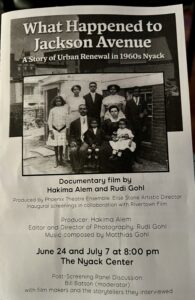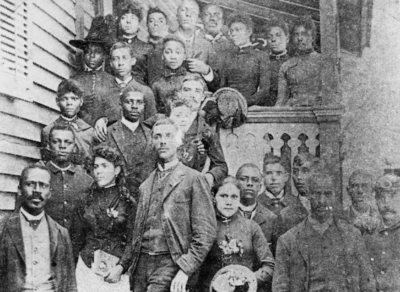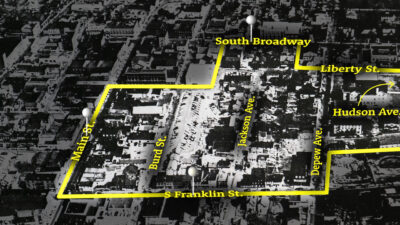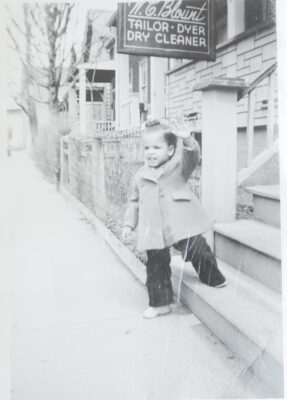
What Happened to Jackson Avenue Articulates the Facts & Consequences of ‘Urban Renewal’ in Nyack

Magazines serving the communities of Northern Westchester

by Inside Press
The first public screenings is Saturday June 24 at 8 p.m., and Friday, July 7 at 8 p.m. at the Nyack Center. Tickets are on sale, now. https://phoenixtheatreensembleorg.thundertix.com/events/213870
Per news direct here from the film’s producer Phoenix Theatre Ensemble in collaboration with Rivertown Films is a summary about the film and information about the gathering of artists and storytellers who have brought it to the screen:
“Urban renewal projects irrevocably changed the landscape of American cities and villages in the 1950s and 1960s. Although intended to stimulate economic and social ‘revitalization,’ many of these projects resulted in the destruction of entire communities.

Nyack has its own urban renewal story, now told in a new documentary through interviews with people who lived the experience. What Happened to Jackson Avenue offers real-life accounts of the human impact–deeply felt by the124 Nyack families, nearly 80% Black, who lost their homes, businesses and generations of accumulated wealth to ‘eminent domain.’
“This film is essential to an understanding of Nyack’s history, and provides an important case study of how even a small village was shaped by the broader forces driving urban renewal policies in the 1960s,” said Elijah Reichlin-Melnick, Former NY State senator. The first public screenings will be held at The Nyack Center, located on South Broadway and Depew Avenue, on Saturday, June 24 and Friday, July 7 at 8 pm.
Tickets are on sale now for $25 in advance and $35 at the door.

Panel discussions following the 60-minute screenings will give audiences opportunities to hear live from storytellers interviewed in the film, as well as the documentary creators. Nyack activist, artist and historian Bill Batson (also in the film) will moderate.
Nicole Hines, President, Nyack NAACP, will join the June 24 panel. Hines comments: “Fair housing and home ownership continue to be key issues for the NAACP and for everyone we represent. We hope this film will advance the discussion and motivate change.”
The documentary was produced by the Phoenix Theatre Ensemble, a New York City-grown theater company now with a home and annual live arts Festival in Nyack. The public screenings in Nyack are presented in collaboration with the Rivertown Film Society.
“This is a powerful film, and a service to our community as it acknowledges and learns from its history,” commented Don Hammond, Mayor of Nyack
Inspiration for the documentary sprang from a comment made by Batson in the summer of 2019 as he in stood in the main parking lot at the center of the village.
”This was Jackson Avenue. Our family home once stood here,” said Batson.
That spark set a creative process in motion–two-years of research, interviews, photography and editing undertaken by young filmmakers Hakima Alem and Rudi Gohl.
“June 12 marked the 60th anniversary of the assassination of civil rights pioneer and NAACP leader Medgar Evers,” said Batson. “And with Juneteenth just days away, this an especially good time to reflect on the past, present and future of our own community. What Happened to Jackson Avenue challenges us to look back, and look ahead.”
ABOUT THE STORYTELLERS
Bill Batson is well known in the Nyack community as a leader, artist and historian. His grandmother’s family, the Avery’s, moved to Nyack in the late 1800s. They lived through, and spoke out against, urban renewal. His family home on Jackson Avenue was a casualty. Today, Batson is a columnist and featured contributor to Nyack News & Views, where his weekly Sketch Log chronicles the Nyack experience. Batson also manages the weekly Farmers Market for the Nyack Chamber of Commerce.
Faith Blount is a Nyack native who experienced urban renewal first-hand as a child. Her family lived with her grandparents in a house on Liberty street, with their dry cleaning business attached. While both their home and business were demolished during urban renewal, they received compensation for the residence only. Blount’s grandfather was a civil rights leader and founder of the NAACP chapter in Nyack. Blount is a teacher and a role model for young Black people wherever she goes.
Lonnie “Buster” Leonard is a Nyack native who grew up on Jackson Avenue in the 1950s. He experienced urban renewal as a teenager when he lost his home and saw his friends and community forced out. His family moved to High Avenue just before the demolition began. Their old home on Jackson Avenue was destroyed shortly thereafter.
Win Perry is a historian and architect who comes from a long line of Nyack locals. He currently resides in the house his family built in 1846. His grandson is the 12th generation of his family to live in Nyack. Perry worked for an architectural firm in Nyack during urban renewal and saw both sides of the process. Avid historian and past president of the local historical society, Perry currently serves as a member of the executive board. He was a member of the NAACP and has served as an educator on urban renewal and city planning.
Barbra Williams was born in Anniston, Alabama and moved to Nyack in the early 1960s just before urban renewal got under way. She was an avid member of the protests against the project. In 1965, she managed the campaign that won Heziekiah Easter a seat on the Village of Nyack Board of Trustees–the first Black person elected to public office in Rockland County. Williams was inducted into Rockland County’s Civil Rights Hall of Fame in 2016 for her work in fighting discrimination against people of color and the disadvantaged. She describes herself as a storyteller, memory keeper and “ancestor in training.”
ABOUT THE ARTISTS
Hakima Alem is an Ethiopian writer and film director. She moved to Nyack in 2018, and now resides in New York City. Alem graduated from Bard College in 2021. Her work centers on the lives of women of color, human rights and international adoption. She has worked on several documentary films and with multiple nonprofits. Before directing What Happened To Jackson Avenue, she was an assistant editor for the film Muicha, The Voice of Bossa Nova and created her own film titled Black at Bard 2020. Moving forward, Alem hopes to publish novels and continue creating and directing documentaries and other films.
Rudi Gohl is a filmmaker, documentarian and editor based in New York City. Since graduating from college in 2021, Gohl has worked extensively in New York, filming and editing music videos, short films, plays and documentaries. Offering a wide range of creative possibilities, the documentary format is of particular interest to Gohl. He has recently worked with the musical artist Chandrika Tandon, and multi-cultural artist Eljuri. He currently works as a junior assistant editor and post-production assistant for the award-winning documentary company Show of Force.
Faith Blount is a Nyack native who grew up in the midst of Nyack’s Urban Renewal Program. Her family lived with her grandparents, who owned a house on Liberty street that had their dry cleaning business attached. During Urban Renewal, they were compensated for their home as a residence only, not as a business. The Blounts moved to Orangeburg shortly after. Photo by Rudi Gohl

Voluntary subscriptions are most welcome, if you've moved outside the area, or a subscription is a great present idea for an elderly parent, for a neighbor who is moving or for your graduating high school student or any college student who may enjoy keeping up with hometown stories.